|
Books Should Be Free Loyal Books Free Public Domain Audiobooks & eBook Downloads |
|
|
Books Should Be Free Loyal Books Free Public Domain Audiobooks & eBook Downloads |
|
Essay/Short Nonfiction |
|---|
|
Book type:
Sort by:
View by:
|
By: Christopher Morley (1890-1957) | |
|---|---|
 Pipefuls
Pipefuls
A delightful collection of 48 essays on various topics of the human condition that caught his fancy. Witty, insightful and funny of course and on occasion thought provoking and even disturbing. From the preface "These sketches gave me pain to write; they will give the judicious patron pain to read; therefore we are quits. I think, as I look over their slattern paragraphs, of that most tragic hour—it falls about 4 p. m. in the office of an evening newspaper—when the unhappy compiler tries to round up the broodings of the day and still get home in time for supper... | |
By: Saint Patrick (d. 461 or 493) | |
|---|---|
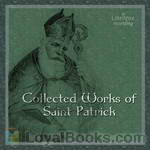 Collected Works of Saint Patrick
Collected Works of Saint Patrick
St. Patrick’s Breastplate – This prayer is attributed to St. Patrick and his diciples. It is written with some celtic pagan elements, but is definitely a Christian prayer asking God for protection through daily life. A Letter to the Soldiers of Coroticus – Patrick writes this letter to excommunicate the soldiers of Coroticus’ army who pillaged villages in Ireland and forced many Christian converts into slavery. Confession – A short autobiography by St. Patrick who tells of being abducted... | |
By: John Burroughs (1837-1921) | |
|---|---|
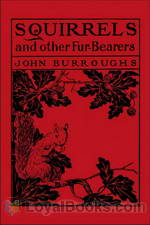 Squirrels and other Fur-Bearers
Squirrels and other Fur-Bearers
Squirrels and other Fur-Bearers, a collection of essays by American naturalist and essayist, John Burroughs, provides fascinating insight into the daily life of small woodland creatures. Included in these essays are Burrough’s personal observations of squirrels, rabbits, mink, and chipmunks, as well as numerous other small mammals. Highly recommended for anyone, both young and old, with an interest in nature and wildlife! | |
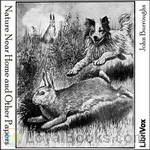 Nature Near Home and Other Papers
Nature Near Home and Other Papers
Nature Near Home is one of many books on natural history by John Burroughs. It is full of simple observations about rural scenes and charming stories about animals, plants, and even people! Burroughs loves the creatures around him and derives great pleasure from his walks and studies in nature’s scenes. | |
By: Thomas Henry Huxley (1825-1895) | |
|---|---|
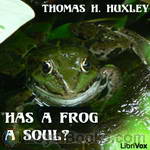 Has a Frog a Soul?
Has a Frog a Soul?
Thomas Huxley, known as “Darwin’s Bulldog” for his championing and development of Darwinism, was perhaps the most important Victorian biologist after Darwin himself. This speech to the Metaphysical Society in 1870 is one of Huxley’s best known texts outside the sphere of his specialism, and remains read today by students of philosophy. In it, Huxley argues from the results of vivisection to metaphysics. | |
By: Marcus Tullius Cicero | |
|---|---|
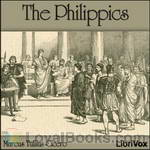 The Philippics
The Philippics
A philippic is a fiery, damning speech delivered to condemn a particular political actor. The term originates with Demosthenes, who delivered an attack on Philip II of Macedon in the 4th century BCE.Cicero consciously modeled his own attacks on Mark Antony, in 44 BC and 43 BC, on Demosthenes’s speeches, and if the correspondence between M. Brutus and Cicero are genuine [ad Brut. ii 3.4, ii 4.2], at least the fifth and seventh speeches were referred to as the Philippics in Cicero’s time. They were also called the Antonian Orations by Aulus Gellius... | |
By: Giles Lytton Strachey (1880-1932) | |
|---|---|
 Eminent Victorians
Eminent Victorians
On Modern Library's list of 100 Best Non-Fiction books, "Eminent Victorians" marked an epoch in the art of biography; it also helped to crack the old myths of high Victorianism and to usher in a new spirit by which chauvinism, hypocrisy and the stiff upper lip were debunked. In it, Strachey cleverly exposes the self-seeking ambitions of Cardinal Manning and the manipulative, neurotic Florence Nightingale; and in his essays on Dr Arnold and General Gordon, his quarries are not only his subjects but also the public-school system and the whole structure of nineteenth-century liberal values. | |
By: Charles Mackay (1814-1889) | |
|---|---|
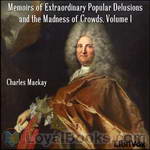 Memoirs of Extraordinary Popular Delusions and the Madness of Crowds
Memoirs of Extraordinary Popular Delusions and the Madness of Crowds
The book chronicles and vilifies its targets in three parts: “National Delusions”, “Peculiar Follies”, and “Philosophical Delusions”.The subjects of Mackay’s debunking include alchemy, beards (influence of politics and religion on), witch-hunts, crusades and duels. Present day writers on economics, such as Andrew Tobias, laud the three chapters on economic bubbles. | |
By: Isabella L. Bird (1831-1904) | |
|---|---|
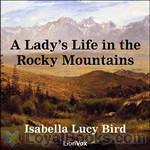 A Lady's Life in the Rocky Mountains
A Lady's Life in the Rocky Mountains
Isabella Bird began travelling while in her early twenties to help alleviate illness that had plagued her since childhood. She was a single woman in her early forties when she made her treck through the Rocky Mountains. A Lady’s Life in the Rocky Mountains details this fascinating account of her travels through a series of letters written to her sister, Henrietta. These letters are filled with beautiful, vivid descriptions of the scenery, the people she encountered, the way of life, and a mountain man named Jim Nugent, that was as rough as they come, but a complete gentleman with Ms... | |
By: Chesterton, G. K. | |
|---|---|
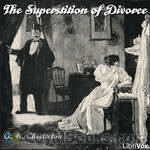 The Superstition of Divorce
The Superstition of Divorce
This short book was written in 1920, and in it Chesterton, with his usual wit and incisive logic, presents a series of articles defending marriage and indicating the weaknesses in divorce. He did this 16 year before the first Christian denomination in the world allowed it’s members to divorce. Till then Christendom was unanimous in standing against it. Chesterton saw clearly the trends of this time, and delivered this defense. | |
By: Lafcadio Hearn (1850-1904) | |
|---|---|
 In Ghostly Japan
In Ghostly Japan
This collection of 14 stories collected by Lafcadio Hearn, contains Japanese ghost stories, but also several non-fiction pieces. Hearn tries to give a glimpse into the customs of the Japanese, by giving examples of Buddhist Proverbs and explaining the use of incense and the nation wide fascination with poetry. Furthermore, he has again translated several hair-rising ghost stories, like "A Passional Karma" about the truly undying love of a young couple. | |
 Kokoro: Hints and Echoes of Japanese Inner Life
Kokoro: Hints and Echoes of Japanese Inner Life
In an introductory paragraph, Lafcadio Hearn declares his intention: "The papers composing this volume treat of the inner rather than of the outer life of Japan, for which reason they have been grouped under the title Kokoro (heart). Written with the above character, this word signifies also mind, in the emotional sense; spirit; courage; resolve; sentiment; affection; and inner meaning, just as we say in English, "the heart of things."" The result is a highly eclectic collection of stories, diary... | |
By: Harry Bates, Editor | |
|---|---|
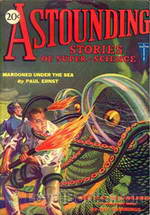 Astounding Stories of Super-Science, September 1930
Astounding Stories of Super-Science, September 1930
This is a collection of short science fiction stories by various writers, circa 1930. Writers include Paul Ernst, Miles Breuer, Ray Cummings, Sewell Wright, and others. | |
By: British Parliament | |
|---|---|
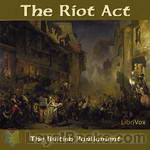 The Riot Act
The Riot Act
The Riot Act was passed by the British Parliament in 1714, the first year of the reign of George I, and came into effect in August 1715. This was a time of widespread social disturbance, as the preamble describes; the Act sought to put an end to this. A group of twelve or more people, “being unlawfully, riotously and tumultuously assembled”, would be read a proclamation; they must disperse within an hour, on pain of death. The same fate would befall anyone preventing the reading of the proclamation, or damaging buildings while on a riot... | |
By: United States Arms Control and Disarmament Agency | |
|---|---|
 Worldwide Effects of Nuclear War: Some Perspectives
Worldwide Effects of Nuclear War: Some Perspectives
This is a concise yet thorough explanation of what might happen to our world in the aftermath of a nuclear war. The myriad of potential effects will be global and wide-spread, and the potentials are glazed over in this short work. | |
By: Jerome K. Jerome (1859-1927) | |
|---|---|
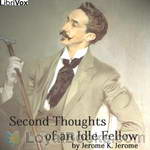 Second Thoughts Of An Idle Fellow
Second Thoughts Of An Idle Fellow
A second volume of humorous essays on various subjects, following the success of Idle thoughts Of An Idle Fellow. | |
By: Michel Eyquem de Montaigne (1533-1592) | |
|---|---|
 Essays, Book 1
Essays, Book 1
Michel Eyquem de Montaigne is one of the most influential writers of the French Renaissance, known for popularising the essay as a literary genre and is popularly thought of as the father of Modern Skepticism. He became famous for his effortless ability to merge serious intellectual speculation with casual anecdotes and autobiography—and his massive volume Essais (translated literally as "Attempts") contains, to this day, some of the most widely influential essays ever written. | |
By: Friedrich Kerst | |
|---|---|
 Mozart, The Man and the Artist as Revealed in His Own Words
Mozart, The Man and the Artist as Revealed in His Own Words
Wolfgang Amadeus Mozart. His name is one of the most recognizable names in history and one of the most enduring of composers. At age 5, this “wunderkinder” took to the stage and began his life as a prolific and celebrated creator-genius of such luminous works the world has not known since. This collection of morsels taken from his personal letters is engaging and gives a look into the mind of the boy wonder. Was he mad? Was he miraculous? | |
By: Stamp Act Congress of 1765 | |
|---|---|
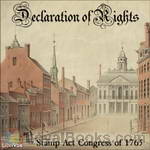 Declaration of Rights
Declaration of Rights
On June 8, 1765 James Otis, supported by the Massachusetts Assembly sent a letter to each colony calling for a general meeting of delegates. The meeting was to be held in New York City in October. Representatives from nine colonies met in New York. Though New Hampshire, Virginia, North Carolina and Georgia did not send delegates, the Assemblies of those missing colonies nonetheless agreed to support the works of the Congress. The meetings were held in Federal Hall in New York, and the delegates assembled on October 2... | |
By: Edmund Gosse | |
|---|---|
 Gossip in a Library
Gossip in a Library
A collection of informal essays about books in his library. He combines commentary, translations, and humorous asides about authors and their subjects. | |
By: Bliss Perry (1860-1954) | |
|---|---|
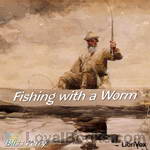 Fishing with a Worm
Fishing with a Worm
Fishing with a Worm by Bliss Perry includes the poignant and philisophical observations of a fly fisherman lured by the worm. Bliss Perry was a professor of literature at Princeton and Harvard Universities and spent time in Vermont writing and fly fishing. | |
By: Goldsworthy Lowes Dickinson (1862-1932) | |
|---|---|
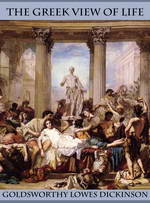 The Greek View of Life
The Greek View of Life
“With the Greek civilisation beauty perished from the world. Never again has it been possible for man to believe that harmony is in fact the truth of all existence.”This elegantly-written work provides a splendid introduction to the Greeks of the classic period: how they thought, wrote, and organised their lives and loves. Although it dates from the 1890s, there is very little about it that has dated. To its author’s credit, the subject of “Greek love” is dealt with in a sane and factual context - despite the judicial assassination of Oscar Wilde going on in the background... | |
By: Antonio Colmenero de Ledesma (d. 17th century) | |
|---|---|
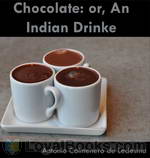 Chocolate: or, An Indian Drinke
Chocolate: or, An Indian Drinke
The Author sings the praises of Chocolate. “By the wise and Moderate use whereof, Health is preserved, Sicknesse Diverted, and Cured, especially the Plague of the Guts; vulgarly called _The New Disease_; Fluxes, Consumptions, & Coughs of the Lungs, with sundry other desperate Diseases. By it also, Conception is Caused, the Birth Hastened and facilitated, Beauty Gain’d and continued.” | |
By: Bruce Barton (1886-1967) | |
|---|---|
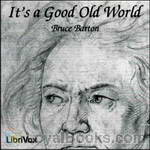 It's a Good Old World
It's a Good Old World
In this collection of essays, Bruce Barton, considered to be among the most influential advertising men of the 20th century, uses history, religion and current events of the 1920s to teach common sense ideals. From Jesus to Beethoven to Napoleon to Abraham Lincoln, Barton uses stories of great individuals to encourage the reader to make the most of life and at the same time to build strong character traits. | |
By: Henry W. Lucy (1845-1924) | |
|---|---|
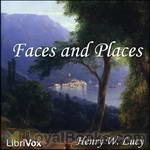 Faces and Places
Faces and Places
Faces and Places is a collection of articles on nineteenth century travel, events and personalities by the British journalist Henry Lucy, who wrote for the Daily News, a London newspaper. His open letter To Those About to Become Journalists rings as true today as when it was written.The first article, “Fred” Burnaby, includes a lively account of a balloon trip, while Night and Day on the Cars in Canada and Easter on Les Avants relate Lucy’s experiences of rail travel at that time. Other travel tales (A Night on a Mountain, Mosquitoes and Monaco, and Oysters and Arcachon) provide an insight into the Victorian Englishman’s attitude to Europe... | |
By: Robert Millikan (1868-1953) | |
|---|---|
 On the Elementary Electrical Charge
On the Elementary Electrical Charge
The experiments herewith reported were undertaken with the view of introducing certain improvements into the oil-drop method of determining e and N and thus obtaining a higher accuracy than had before been possible in the evaluation of these most fundamental constants. From the Physical Review, Vol. II, No. 2 | |
By: Dame Shirley (d.1906) | |
|---|---|
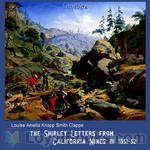 The Shirley Letters from California Mines in 1851-52
The Shirley Letters from California Mines in 1851-52
Louise Amelia Knapp Smith Clappe moved to California from Massachusetts during the Gold Rush of the mid-1800’s. During her travels, Louise was offered the opportunity to write for The Herald about her travel adventures. It was at this point that Louise chose the name “Shirley” as her pen name. Dame Shirley wrote a series of 23 letters to her sister Mary Jane (also known as Molly) in Massachusetts in 1851 and 1852. The “Shirley Letters”, as the collected whole later became known, gave true accounts of life in two gold mining camps on the Feather River in the 1850s... | |
By: Walter Pater | |
|---|---|
 Appreciations, with an Essay on Style
Appreciations, with an Essay on Style
Appreciations, with an Essay on Style, is a collection of Walter Pater's previously-published essays on literature. The collection was well received by public and critic since its first edition, in 1889. The volume includes an appraisal of the poems of Dante Gabriel Rossetti, first printed in 1883, a few months after Rossetti's death; an essay on Thomas Browne, whose Baroque style Pater admired; and a discussion of Measure for Measure, one of Pater's most often reprinted pieces. The second edition, published in 1890, had a few modifications, and is the basis for all other editions of the book. | |
By: Joseph Lister (1827-1912) | |
|---|---|
 On the Antiseptic Principle of the Practice of Surgery
On the Antiseptic Principle of the Practice of Surgery
Joseph Lister was born near London in 1827. He studied medicine at the University of London and pursued a career as a surgeon in Scotland. He became professor of Surgery in Glasgow and later (1877) at Kings College Hospital, in London. Lister’s contribution to the advancement of surgery cannot be overestimated. Before his work on antisepsis, wounds were often left open to heal, leading to long recoveries, unsightly scarring, and not infrequently amputation or death due to infection. Lister’s work enabled more wounds to be closed primarily with sutures, drastically reducing healing time, scarring, amputations, and deaths due to infection... | |
By: Charles McRae | |
|---|---|
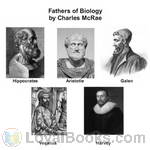 Fathers of Biology
Fathers of Biology
An account given of the lives of five great naturalists (Hippocrates, Aristotle, Galen, Vesalius and Harvey) will not be found devoid of interest. The work of each one of them marked a definite advance in the science of Biology. There is often among students of anatomy and physiology a tendency to imagine that the facts with which they are now being made familiar have all been established by recent observation and experiment. But even the slight knowledge of the history of Biology, which may be obtained from a perusal of this little book, will show that, so far from such being the case, this branch of science is of venerable antiquity... | |
By: Wright, Orville and Wilbur (1871-1948 / 1867-1912) | |
|---|---|
 The Early History of the Airplane
The Early History of the Airplane
The Brothers Orville (1871 - 1948) and Wilbur (1867 – 1912) Wright made the first controlled, powered and sustained heavier-than-air flight, on 17th December 1903. They were not the first to build and fly aircraft, but they invented the controls that were necessary for a pilot to steer the aircraft, which made fixed wing powered flight possible. The Early History of the Airplane consists of three short essays about the beginnings of human flight. The second essay retells the first flight: "This... | |
By: Oliver Wendell Holmes, Sr. (1809-1894) | |
|---|---|
 My Hunt After 'The Captain'
My Hunt After 'The Captain'
Holmes describes his frantic search through Civil War torn landscapes for his wounded son, the future Supreme Court Justice. Originally published in The Atlantic Magazine, 1862. Holmes, Sr. (1809 -1894) was an American physician, poet, professor, lecturer, and author. He was regarded by his peers as one of the best writers of the 19th century. His most famous prose works are the "Breakfast Table" series, which began with The Autocrat of the Breakfast Table (1858). He is also recognized as an important medical reformer. | |